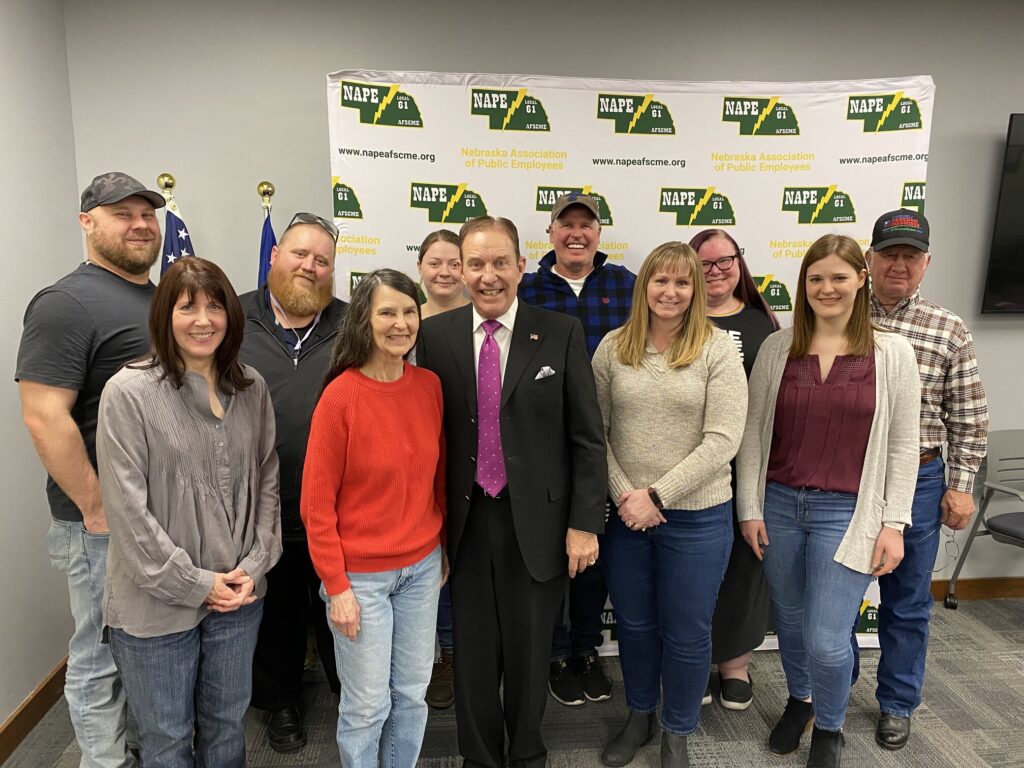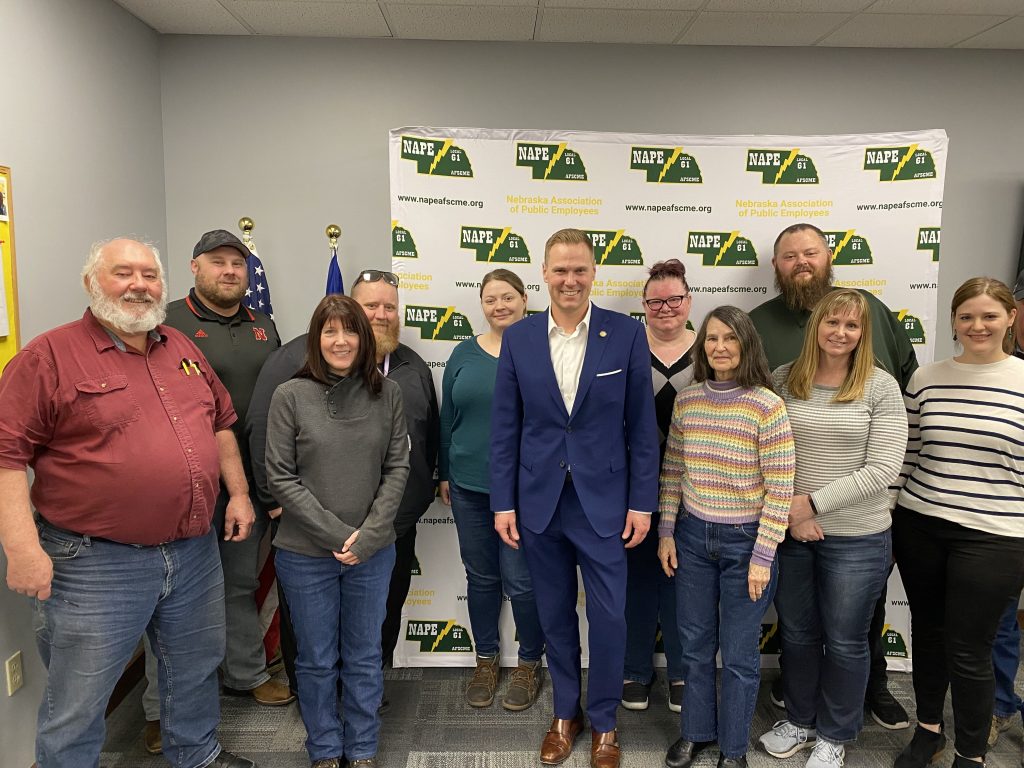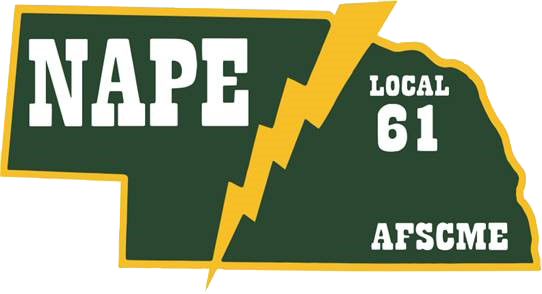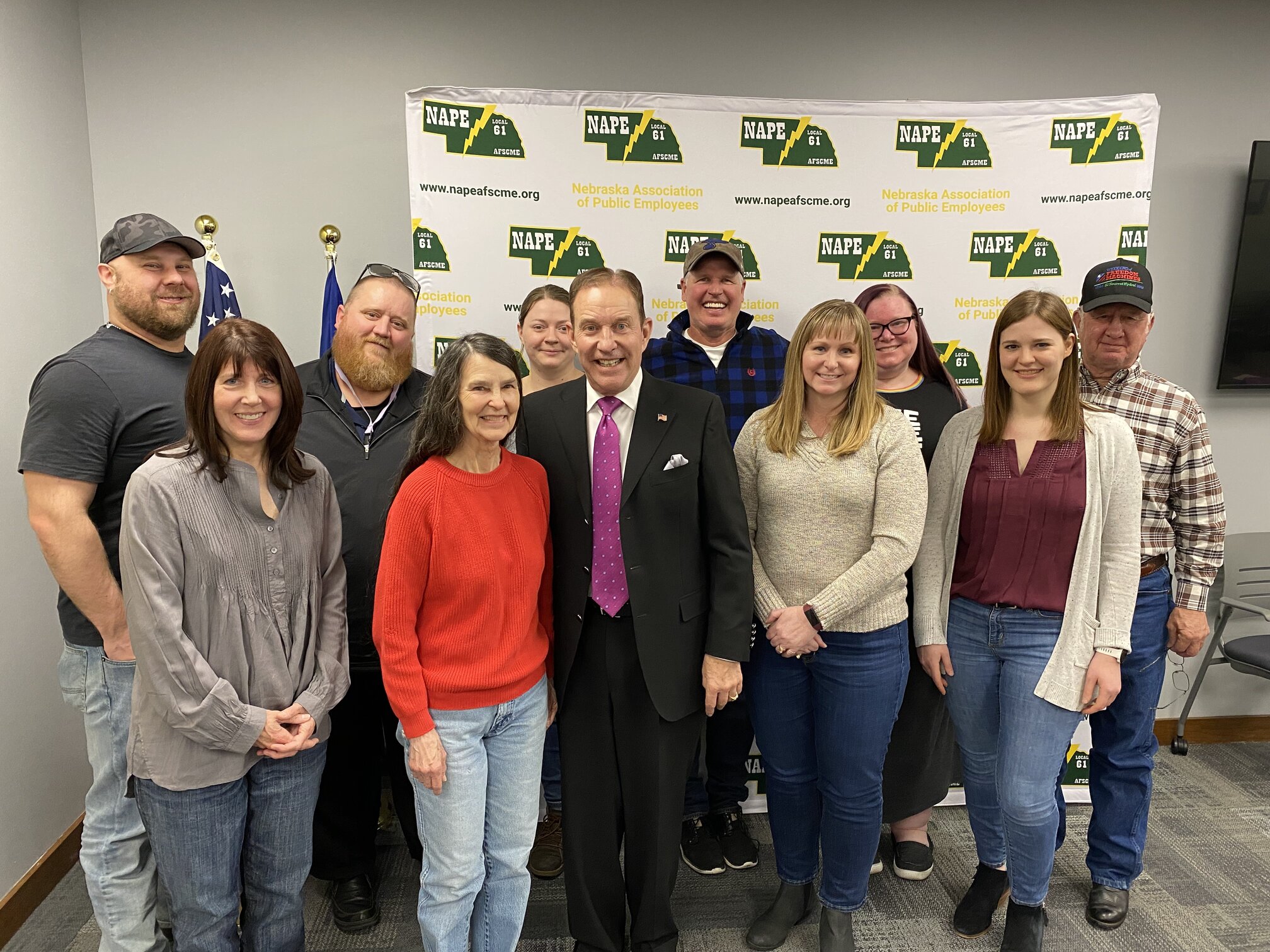In March, the NAPE Government Affairs Committee interviewed four candidates running for the office of Nebraska Governor at our headquarters in Lincoln. Candidates that participated in the interviews were Democratic candidate Carol Blood and Republican candidates Charles Herbster, Brett Lindstrom, and Jim Pillen. Republican candidate Theresa Thibideau declined to participate.
The committee questioned the candidates on topics such as public services, collective bargaining rights, state employee wages, and their priorities for state agencies. After meeting with the candidates, the committee deliberated and made a recommendation to the NAPE Board of Directors on endorsements. The Board will consider the committee’s recommendations and announce any endorsement action in early April.
It is important for NAPE members to be active and vote in the May 10 primary elections. The Governor of Nebraska is responsible for negotiating our labor contract and selecting agency heads who set policy at code agencies. A summary of each candidate’s interview is included below. The committee is appreciative to all the candidates for spending time with us and explaining their positions on issues important to state employees.
Republican Candidate Interview Summaries
Charles Herbster

Charles Herbster grew up in Falls City, Nebraska on Carico Farms; a homestead built by his great-great-grandfather in 1847. Herbster is now the owner and chief executive of Herbster Angus Farms, North American Breeders Inc., Agri-Solutions Inc., Judy’s Dream Inc., Carico Farms Inc., and the Conklin Company Inc. He is running for governor to “make a difference in the nation” and to help the state by supporting farmers, improving the tax system, and carrying out policies established by Donald Trump.
When asked which public services he utilizes and values, Herbster referred to himself as “a law and order candidate”. He believes that first responders should have increased funding and he also plans to keep all public services and programs fully funded to meet public needs.
When asked how he would utilize federal funding towards infrastructure projects, he emphasized the importance of housing, jobs, and keeping people in the state. Though not a major supporter of federal funding, Herbster believes that by improving roads and the state’s broadband capacity, infrastructure funding can be strategically used to support Nebraska’s small businesses.
While Herbster is not opposed to outsourcing, he believes the state should first attempt to “utilize the talent we have here.” He believes that employees from Nebraska possess institutional knowledge and that any considerations to privatize state jobs should factor in the “interests of the voters.” Herbster also believes that the state could benefit greatly from public/private partnerships, using Nelnet as an example.
Herbster supports our member’s right to collective bargaining and feels it is the right of Nebraska’s public employees to unionize. When asked what he would do about stagnant wage increases for public employees especially during a high inflationary environment, Herbster said he would negotiate higher wages. “1.7% doesn’t cut it”, he stated. Herbster also supports paid parental leave, citing his own company’s plan that pays 100% of the employees salary for the first four weeks, 90% for the next 5-10 weeks, and 80% for 11 to 26 weeks. He also mentioned that his company’s employee turnover rate was around 2%.
Herbster also believes that updating Nebraska’s tax code could help improve the state’s staffing issues. His goal would be to pursue a structure similar to South Dakota and Iowa, reflecting on his own experience owning land and paying taxes. He also believes that community colleges and trade schools should be promoted as viable and valuable career options to students, which could help retain future state employees. Lastly, Herbster is open to creating a cabinet position that would investigate and address why turnover is occurring in state agencies.
Herbster stated he plans on appointing agency heads with values such as integrity, loyalty, and trustworthiness. They must believe in the state of Nebraska, work with a positive attitude, and be trustworthy. Herbster believes his candidacy is built on “working together” and refusing to alienate or shut down anyone that disagrees with him.
Sen. Brett Lindstrom

Brett Lindstrom grew up in Omaha, Nebraska. Graduating from Millard West High School, Lindstrom established a career in investing and was later elected a Nebraska a state senator. As a fiscal conservative, Lindstrom has been at the forefront of economic development and tax reform in the state and has worked hard to combat higher taxes, over-regulation of small businesses, and growing government spending.
Lindstrom supports all of Nebraska’s public services and explicitly mentioned his use of highways when asked which ones he utilizes the most. When asked whether he supports the expansion or addition of the state’s public services, Lindstrom said that he will focus on the community’s needs as governor; directing funds not towards a new prison, but towards education and mental health. The key, says Lindstrom, is not to increase spending but to “redirect spending.” Lindstrom believes that competitive wages and improved pensions are necessary to keep workers in public service.
Lindstrom believes that federal funding for infrastructure projects could be utilized to improve Nebraska’s broadband deficiency, which he states is present even in Lincoln and Omaha. He also believes that certain highways should be increased from two to four lanes, explicitly mentioning highway 275. Lindstrom opposes the privatization of state services to private entities and does not wish to expand or mandate any efforts to contract out public services. He says that he will work to oppose efforts to establish privatization. He is in favor of public/private partnerships and believes that these partnerships could be “good for the community.”
Lindstrom also supports the right of Nebraska’s State Employees to unionize and collectively bargain for wages and conditions of employment. Lindstrom feels that to rectify the current stagnant wages of public employees and the ever increasing inflation rate, Nebraska needs to be able to compete with other states to retain the workforce. “You can’t incentivize people without opportunity.” stated Lindstrom. In order to retain staff, he feels that working conditions need to improve, burnout needs to be reduced, and wages need to be increased. He is also a supporter of paid parental leave and believes preschools should be “funded at 100%.” “There are opportunities for the state to provide childcare for working parents.”
In order to fill cabinet positions and agency heads, Lindstrom will look for candidates that are competent, empathetic to the people they serve, and capable of working with others. “Party doesn’t matter”, says Lindstrom. “I don’t want cabinet heads that will follow politics rather than morals.” Lindstrom believes his experience in the state legislature is valuable and that his track record demonstrates his ability to listen and act. His goals as governor are to improve the perception of Nebraska throughout the U.S., bridge the gap between rural and urban Nebraskans, and to ensure that the next ten years are not the same as the last.
Jim Pillen

Jim Pillen grew up in Platte County, Nebraska raising pigs with his father. After earning a Bachelor’s Degree in Animal Science at UNL and a doctorate of veterinary medicine at Kansas State, Pillen returned to Nebraska and worked as a veterinarian. In 1993, he started Pillen Family Farms which has created over a thousand jobs for Nebraskans. Pillen is now running for governor on four words: “kids, taxes, agriculture, and values”.
When asked about his utilization of public services, Pillen emphasized the importance of public safety, mentioning firefighters and paramedics, who are “the lifeblood of our communities”. He also spoke about his great appreciation for Nebraska’s state parks and the maintenance of our public roadways.
While Mr. Pillen agrees that public services and programs should remain fully funded to meet public needs; he did not comment on whether these services should be expanded or not. He believes public services should focus on needs rather than wants stating, “If there are things that are nice but not necessarily needed, they might be put back on the shelf.”
When asked how he would prioritize federal funding towards infrastructure projects, he emphasized his desire to speed up productivity that was hindered by the pandemic. He also wants to ensure that public roads and highways, specifically highways 30, 275, and 81, are safe and completed to four-lane capacity.
In regard to the privatization of state services, Pillen stated that considerations for outsourcing would go on a case-by-case basis. While he prefers to focus on internal opportunities, he believes there can be exceptions and benefits to contracting state services out to private entities. Similarly, Pillen supports public/private partnerships, highlighting the success of the University of Nebraska Medical Center and its use of private and public funding.
Pillen supports state employee’s collective bargaining rights and supports the right of Nebraska’s State Employees to unionize. After purchasing the Hormel packaging plant in Fremont, Pillen kept the plant’s union believing it improved the quality of people at the facility and their work. Pillen also pointed out that two campuses under the Nebraska Board of Regents, of which Pillen is a member, are also unionized.
Pillen also shared his stance on the state’s staffing issues, believing current shortages are a “multifactorial issue” compounded by retirement and out-migration. His proposed solution is to encourage children to stay in Nebraska, emphasizing the importance of trade schools and community colleges. Pillen does not support paid parental leave, but does support unpaid time off for new parents and nursing rooms on the job site. In regard to wages and the inflation rate, Pillen suggested trimming areas of “surplus” to allocate more funding elsewhere. “We always have to have the best people to provide the best services”, stated Pillen. “We have to figure out how to do more with less”.
Pillen said he will appoint agency heads that can assess people and care for the state of Nebraska. He wants to appoint leaders that are “firm in their word” and committed to making Nebraska better. He believes he should be governor because he “loves Nebraska, is very passionate, and cares about people deeply.”
Democrat Candidate Interview Summarry
Sen. Carol Blood

Carol Blood was born in McCook, Nebraska. A State Senator, former member of the Bellevue city council, and a former state employee herself, Blood feels she brings something different to the table and is a long time supporter of labor unions and the Nebraska Association of Public Employees.
Carol Blood does not believe you can “get out of bed without using public services.” She mentioned how plowed roads, clean waterways, and disability services are vital to the state of Nebraska. Blood believes we should expand these services by modernizing state agencies. “Technology is woefully behind in every department,” stated Blood. When asked whether she would work to ensure that public services and programs are fully funded to meet public needs, her answer was a resounding yes.
When asked how she would utilize federal funding towards infrastructure projects, Blood stated that she would base allocation on the opinions of Nebraskans and public employees. Blood believes in the use of strategic planning and bringing everyone to the table is critical to the effective implementation of federal funding. Blood briefly mentioned project ideas such as a railway between Lincoln and Omaha, improvements to Nebraska’s airports, and improving the physical plant of the state capitol.
Blood opposes any efforts to privatize or contract state services to private entities but feels that public/private partnerships could be advantageous for things like museums, healthcare, and nonprofit organizations. She opposes any private funds towards prisons however, stating that “it’s not good for employees or the incarcerated.”
Blood is a supporter of collective bargaining rights and fully supports the ability of Nebraska state employees to unionize. She also believes state employees’ wages should match the rate of inflation at a minimum and that Nebraska must “catch up wage-wise” to other states.
Blood said she supports paid parental leave, suggesting at least 30 days of paid time off. She also mentioned the possibility of staggered hours for new parents and more job flexibility in state government. Blood believes that pay and benefits, as well as flexibility in schedule and hours, are key components in filling vacant state positions. Modernizing agencies through improved technology, better pay and benefits, and a stronger collective voice for employees, is a potential solution to rectify the current turnover rate in Nebraska according to Blood.
In selecting agency heads, Blood is vehemently opposed to nepotism, or “rewarding anyone with cabinet positions.” Blood believes that institutional knowledge, as well as communicative, honest, and hard working individuals, will make the best agency heads. Blood feels she is the strongest pro-labor candidate and believes in the importance of community. She wants to “lead as a steward, not a politician” and wants to give Nebraskan’s the ability to earn a decent wage and retire with dignity.


